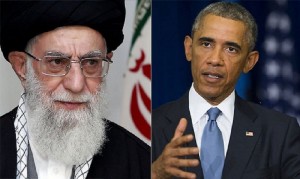Obama, Kerry pat selves on backs after freeing Iranian national security risks

President Barack Obama traded seven Iranians charged with violating U.S. trade sanctions against Iran as part of a historic prisoner agreement with Iran that freed four Americans Saturday. The Iranians were imprisoned or were indicted and awaiting adjudication in United States federal court. The U.S. government also dismissed charges against 14 other Iranians. all outside the United States, with the Obama administration claiming extradition requests would not have met with success.
However, a closer examination of these Iranians being returned to the Islamist republic reveals that they stole classified military and industrial information and gave it to the Iranian government. Also, in some cases the theft of documents and items were intended to assist Iran’s scientists in their development of nuclear weapons.
Despite President Obama’s and Secretary John Kerry’s enthusiasm in pushing a nuclear weapons agreement with Iran—an agreement a majority of lawmakers and Americans oppose — the Deputy Commander of the Iranian Revolutionary Guards Corps, Brigadier General Hossein Salami. boasted to the government-funded Fars News Agency that his military has created advanced unmanned aerial vehicle (UAV) technology.
Gen. Salami claimed that the UAVs, commonly called “drones,” are capable flying 3,000 kilometers—or 1,864 miles—to conduct stealth reconnaissance or to take part in combat missions, according to the Iranian news media. It’s also believed that the Iranians got help from Iranian Americans working for U.S. military contractors in developing their drones.
For example, one of those being traded is Nader Modanlo who became a legal citizen and was well-known in his field of mechanical engineering. However, while working for private companies, NASA and the Pentagon he assisted the Iranian military in launching its first orbiting satellite. Modanlo admitted in court that he was internationally recognized for his expertise in strategic policy affecting the space-based telecommunications industry.
Another Iranian who held dual U.S. and Iranian citizenship, Bahram Mechanic, was indicted in 2014 for illegally sending Iran more than $50 million in U.S. classified technological plans. He helped the Iranian Ministry of Defense, the Atomic Energy Organization of Iran and the Iranian Centrifuge Technology Company, according to the FBI and Justice Department.
“The technology Mechanic sold to Iran is used in a wide range of military systems, including surface-air and cruise missiles. Between July 2010 and 2015, Mechanic’s network allegedly obtained 28 million parts valued at about $24 million worth and shipped them to Iran through Taiwan and Turkey. Among the parts shipped were microelectronics and digital signal processors,” according to the indictment.


